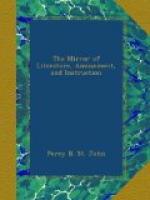We have made several experiments with a view of determining the angle of uncertainty, or the angle within which the ear cannot discover the direction of sounds; but this is not easily done, for it varies with the state of the air and of surrounding objects. If the air is perfectly pure, and if no objects surround the sounding body, the angle of uncertainty will be less than under any other circumstances, as the sound suffers neither deviation nor reflection. If the sounding body is encircled with objects which reflect sound, the echoes arrive at the ear, at short distances, nearly at the same time with the direct sound; and as they form a single sound, the angle of uncertainty must then be much greater, for the sound really arrives at the ear from various quarters. The ventriloquist, therefore, might avail himself of this principle, and choose an apartment in which the reverberations from its different sides multiply the directions of the sounds which he utters, and thus facilitate his purpose of directing the imagination of his audience to the object from which he wishes these sounds to be thought to proceed.
Quarterly Review.
* * * * *
THE GATHERER.
A snapper up of unconsidered trifles.
SHAKSPEARE.
* * * * *
EPITAPH ON STERNE.
How often wrongs our nomenclature,
How our names differ from our nature,
’Tis easy to discern:
“Here lies the quintessence of wit,
For mirth and humour none so fit,
And yet men call him—Stern—e!”
* * * * *
LADIES FORMERLY IN PARLIAMENT.
(For the Mirror.)
Gurdon, in his Antiquities of Parliaments, says, “The ladies of birth and quality sat in council with the Saxon Wita’s.” “The Abbess Hilda (says Bede,) presided in an ecclesiastical synod.”
“In Wighfred’s great council at Beconceld, A.D. 694, the abbesses sat and deliberated, and five of them signed the decrees of that council along with the king, bishops, and nobles.”
“King Edgar’s charter to the Abbey of Crowland, A.D. 961, was with the consent of the nobles and abbesses, who subscribed the charter.”
“In Henry the Third’s and Edward the First’s time, four abbesses were summoned to parliament, viz. of Shaftesbury, Berking, St. Mary of Winchester, and of Wilton.”
“In the 35th of Edward III. were summoned by writ to parliament, to appear there by their proxies, viz. Mary Countess of Norfolk, Alienor Countess of Ormond, Anna Despenser, Phillippa Countess of March, Johanna Fitz Water, Agneta Countess of Pembroke, Mary de St. Paul Countess of Pembroke, Margaret de Roos, Matilda Countess of Oxford, Catherine Countess of Athol. These ladies were called Ad Colloquium et Tractatum, by their proxies, a privilege peculiar to the peerage to appear and act by proxy.”




